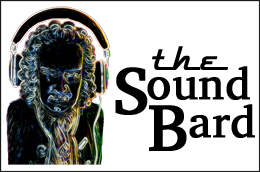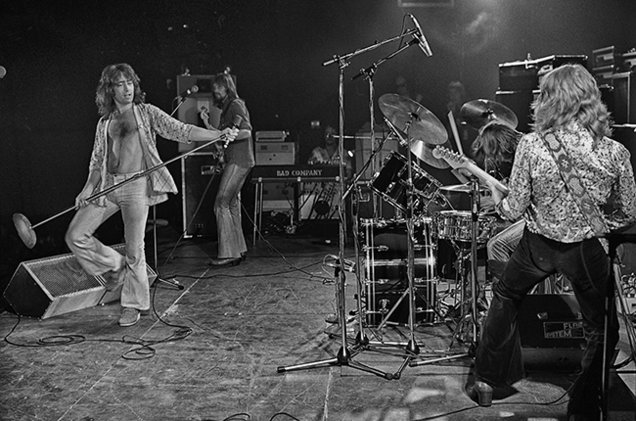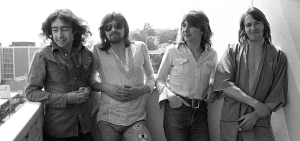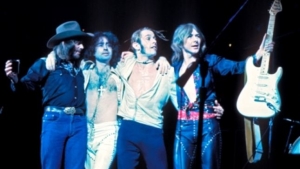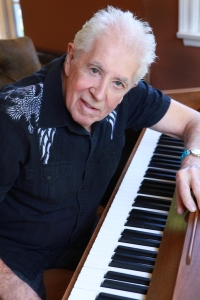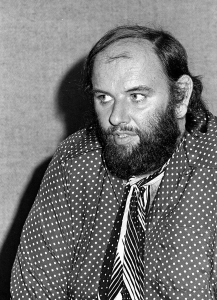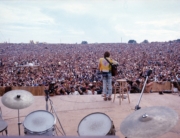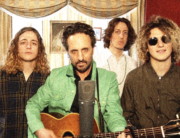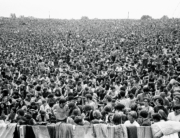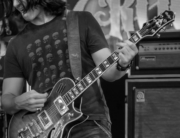BY MIKE METTLER — MAY 4, 2016
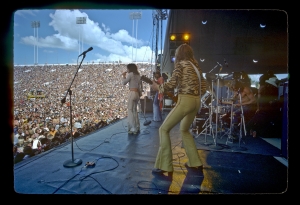
Live Fantasies: Rodgers and Bad Company sing to the masses during their ’70s firestorm. Photo by Carl Dunn.
Any band can sound good in the studio, but it’s the live stage where artists really have to prove their mettle night in and night out, especially if they’re interested in a little ol’ thing called longevity. One group that owned the planks from the minute it first stepped onto them is Bad Company, the British blues-rock collective that further legitimized Led Zeppelin’s Swan Song label upon the release of its mega-selling self-titled debut in 1974.
Even though Bad Company became a hugely successful arena act, they never released a live album to properly chronicle their ’70s heyday — until now, that is, thanks to the double-CD offering Live in Concert 1977 & 1979 (Swan Song/Rhino). The first disc comprises the May 23, 1977 set at the Summit House in Houston, Texas, in support of that year’s Burning Sky LP, and the second disc covers the March 9, 1979 show across The Pond in London in support of 1979’s double-platinum juggernaut, Desolation Angels. This energetic pair of shows showcases both hits (“Shooting Star,” “Feel Like Makin’ Love”) and deep cuts (“Heartbeat,” “Evil Wind”) alike, with limited overlap between the two sets. (More on that in a bit.)
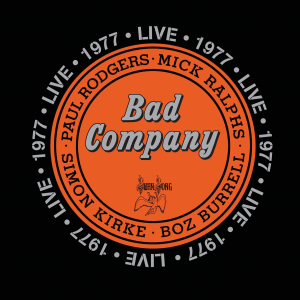 “There have been bootlegs all over the place, but this is the first ever official live album release from the ’70s Bad Co.,” confirms vocalist and band co-founder Paul Rodgers. “And I have to say, I’m very happy with Rhino Records. I requested they master from the original 24-track tapes, not from digital, and they honored that.”
“There have been bootlegs all over the place, but this is the first ever official live album release from the ’70s Bad Co.,” confirms vocalist and band co-founder Paul Rodgers. “And I have to say, I’m very happy with Rhino Records. I requested they master from the original 24-track tapes, not from digital, and they honored that.”
The live stage is also where you can find Bad Company this summer, as they hit the road with tourmate Joe Walsh in Dallas at Gexa Energy Pavilion on May 12. Ex-Black Crowes guitarist Rich Robinson will handle the lead duties for the first time, taking over for Mick Ralphs. This month, the band also travels to Chicago to cut an episode of Soundstage (airdates yet to be determined as of presstime).
If you want to compare material from Live 1977 & 1979 with the respective studio versions, much of it can be found on Rock ’N’ Roll Fantasy: The Very Best of Bad Company, released on both CD and 180-gram vinyl late last year. You may also want to scope out the double-disc deluxe editions of Bad Company (1974) and Straight Shooter (1975), both of which are also on 180g wax. Rodgers can’t yet confirm if the rest of the Bad Co. catalog will receive similar deluxe treatment, but it certainly seems possible (if not inevitable).
And though he’s always on the run, Rodgers, 66, found time in his packed schedule to get on the line with me to discuss the finer aspects of live performing, loving analog, his earliest vocal influences, and the true origins of the band’s name. That Bad Company sound is their claim to fame.
Mike Mettler: Before we get into the live material, I have to say it’s encouraging to hear how Rhino has embraced the analog approach to the overall Bad Company catalog.
Paul Rodgers: A lot of people are jumping on the vinyl bandwagon, but they’re copying from digital, and it’s not the same. Rhino uses the original tapes, which makes me happy. It goes to the soul of the music, so buyer beware! When I recorded my last solo LP, The Royal Sessions [in 2013], it was done all analog. We went from that to the vinyl, and released it on 200-gram virgin vinyl.
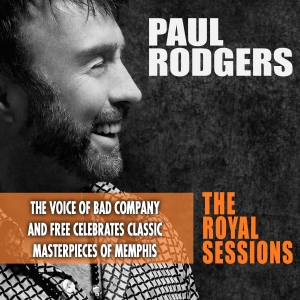 Mettler: I bought that LP at your solo show in New York [at Town Hall on June 19, 2014], and we really get to hear that classic Memphis material sing on vinyl, especially when it comes to the vocal choices you made. I’m also hoping I can drop the needle on this live material at some point so I can catch all the nuances of how you play with the vowel sounds in “Heartbeat” on the 1977 disc, for example.
Mettler: I bought that LP at your solo show in New York [at Town Hall on June 19, 2014], and we really get to hear that classic Memphis material sing on vinyl, especially when it comes to the vocal choices you made. I’m also hoping I can drop the needle on this live material at some point so I can catch all the nuances of how you play with the vowel sounds in “Heartbeat” on the 1977 disc, for example.
Rodgers: Yeah yeah, there is something about that, isn’t there? Somebody told me that digital sounds hit your ear in sharp steps, but analog hits your ear in waves. And although it seems to sound the same, it affects you differently.
Look, it’s convenient to have digital. If you sit in a car, you can’t really put a record player on. But for the real deal, you have to get the ol’ vinyl going. I even like to hear the kee-koooo [mimes sound of needle hitting vinyl for the first time], you know. (chuckles)
Mettler: Yeah, I love that sound too. And you’re right — digital is all 0s and 1s, and when you’re working in the box like that, you’re looking at squares. You’re not getting that analog feel.
Rodgers: That’s right.
Mettler: And with live material like we have here, there’s a certain interplay between you guys that comes through much better in the analog form.
Rodgers: Yeah. Of course, when we recorded these shows, that was the state of the art. That’s how we recorded them, and they’ve been archived ever since. We had kind of forgotten them, and when the record company approached us — I was a little skeptical. I said we’ll listen and we’ll see if we approve it. I had my doubts.
But when I listened to it, I was pleasantly surprised. It really captured a period of time. I was even surprised at some of the set choices we made. We did “Leaving You” [from 1977’s Burning Sky], and I didn’t remember doing that. It’s got a great groove to it.
Mettler: And there’s minimal overlap between the two sets. Only two songs appear in both of them — “Shooting Star” and “Feel Like Makin’ Love.”
Rodgers: Wow! Good point; that hadn’t actually clicked with me. That’s interesting, yeah. We’ve come to a point now where there are certain song we have to do. We have to do “Feel Like Makin’ Love,” we have to do “Bad Company,” we’ve got to do “Shooting Star,” and we’ve got to do “Rock ’N’ Roll Fantasy.” The set starts to write itself after a number of years, and it’s hard to get away from all of those hits. But it’s a nice problem to have.
Mettler: You’re the one who controls the live pacing, which you do so well here. For the 1977 set in Houston, you come out firing with “Burnin’ Sky” and “Too Bad” before you move into that middle section with “Heartbeat” and “Morning Sun,” where you deliberately change the vibe of the show.
Rodgers: Yes, yes, that’s well put, Mike. I’m very conscious of the set list. For me, it’s not just the list of songs; it’s the actual show. You’re live, and you’re putting across the entire voice of the band, in a way. I’m very conscious of the light and the shade in the set, and where to put it. I don’t know that there’s actually a formula, but in a way, you’ve got to come out with a bang, really, and then you’ve got to get closer. There are a lot of elements to it that you must consider. I like to use the songs strategically, to build an overall mood.
Mettler: And you always have a certain rapport with the audience. Right after “Ready for Love” in the Houston set, you ask, “Hey, what do you think of it so far?” Some artists do that rotely, and you can always tell, but I actually believe you’re interested when you ask people that question.
Rodgers: I am. I like communicating with the audience. We’re all communicating as a band with the songs. Tonight is the only night in the world, if you see what I mean there. It’s always brand new and fresh, because we’re in the moment. I try to be, anyway. Maybe that sounds a bit high-falutin’, but every night is different. You’ve got people coming from all walks of life, and they all congregate in this one place. They’re all separate people until a band starts playing, and then it’s like a one-energy field. That’s what people love to feel a part of, and I’m conscious of that too.
Mettler: I like hearing the differences in how you performed “Shooting Star” in ’77 as opposed to ’79. In ’77, you riff on the word “mama,” and then in ’79, you basically talk your way into the final chorus.
Rodgers: And it’s very different now. It’s recognizably the same song, but it’s really developed. The more we play a song, we get into it differently as a band, and the audience participation also changes. I’ve found the audience loves to sing that particular song, so I’ve worked on that. We’ve really developed that one, and it’s become quite the big stage number now. It was just a “song,” originally, and here it is now — those first chords are recognizable throughout the world (sings): “Johnny was a schoolboy…” It’s a lot of fun, actually.
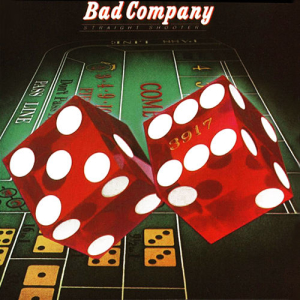 Mettler: Did you have a sense of how people were going to react to “Shooting Star” after you had written it?
Mettler: Did you have a sense of how people were going to react to “Shooting Star” after you had written it?
Rodgers: You never really (pauses) — well, I don’t know. For me, I thought, “This is definitely how I feel. This expresses how I feel about the music business, and life itself. This expresses it for me, and I hope it does for other people.”
This was a song I had been thinking about: “Wow, this is not a war zone; this is the entertainment business. Why are so many people dropping like flies?” You know — Jimi Hendrix, Janis Joplin, and Jim Morrison, just to name a few. And it still goes on, strangely enough.
I liked it from the start. It was going around in my mind, and I was walking around my cottage in England when I started to sing the chorus (sings), “Don’tchoo know that you…” — and I thought, “Oh, I’ve heard that on the radio somewhere. I wonder when I heard that?” Sometimes songs come to you, rather than you writing them. It’s very strange. But then I thought, “No, I haven’t heard that on the radio.” I pulled out the guitar and worked the chords out and everything. It just sort of flowed out.
Mettler: Do you feel as a songwriter that you’re channeling a wave, and sometimes things just hit you and you have to get them out?
Rodgers: I do. Yes, I do. I’ve been asked to analyze what it is, but I find the more you analyze, the less you really know. You just open yourself to it. I think everybody’s got a song inside them, at least one song. It’s just a matter of getting in tune with it. It’s a matter of keeping an open mind, open ears, open eyes, and an open heart — and then listening and being open to it.
Mettler: Both Bob Dylan and Keith Richards have said there’s a wave up there, where the faucet turns on and the faucet turns off — and when you’re ready to receive, you have to let it flow through you. You can’t force it.
Rodgers: Yeah, wow. That’s so interesting that they experience the same thing; that’s how they do it too. That’s amazing.
Mettler: That’s good company to be in, so to speak.
Rodgers: Yeah. (chuckles)
Mettler: It also speaks to the longevity of an artist like yourself – that you can write songs over a long period of time that have that kind of impact on people.
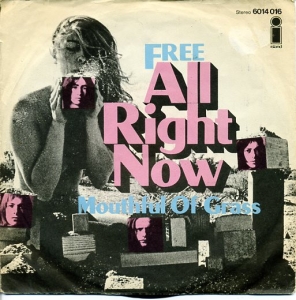 Rodgers: I think part of the art is simplicity, really. The simpler the message, the more broad the meaning, in many respects. I’ve been asked about [Free’s monster 1970 hit] “All Right Now” often enough. It’s the sort of song, a story that happens all the time — boy meets girl, BOOM. And each time it happens, it’s a brand new story. That’s what’s I find interesting.
Rodgers: I think part of the art is simplicity, really. The simpler the message, the more broad the meaning, in many respects. I’ve been asked about [Free’s monster 1970 hit] “All Right Now” often enough. It’s the sort of song, a story that happens all the time — boy meets girl, BOOM. And each time it happens, it’s a brand new story. That’s what’s I find interesting.
Mettler: And that was the song that shot Free to instant international awareness. I think my favorite line in it remains, “Let’s move before they raise the parking rate.”
Rodgers: (chuckles) Isn’t that funny? Even then — what’s that, like fortysomething years ago, and it’s still the case, right? (both laugh heartily)
Mettler: Sad but true, yes! On the ’79 disc, a performance of “Hey Joe” in Washington, DC [from June 26, 1979, at the Capitol Center] is included as a bonus track. Why did you decide to put it on there?
Rodgers: Well, talk about a “Rock ’N’ Roll Fantasy”—I’ve always had a Hendrix fantasy. Although I play guitar, I’m not actually a guitar player; it’s not my main thing. But when I first saw Jimi Hendrix, that was the first song he was playing on the television in the UK [on Ready Steady Go!, December 16, 1966]. It just blew my mind! It was like, “whoooosh,” what is this?
First of all, he looked incredible. He was playing this bluesy song, and I’ve always loved the blues — but this was blues rock. And then in the middle of it, he plays the guitar with his teeth — that was it. I mean, the feel of that song (sings melody line), do do, do-doo-doo… So I was indulging my own Hendrix fantasy on the encore there. (laughs)
Mettler: And you did it some more when you put out that EP called The Hendrix Set a while back [in 1993], with Neal Schon on lead guitar.
Rodgers: Yes! That’s right, It was an excellent time. [The Hendrix Set was recorded at Bayfront Park in Miami, Florida, on July 4, 1993.]
Mettler: Let’s talk about the records you listened to while you were growing up in England, and how they may have influenced you as a singer in the ’60s.
Rodgers: Well, you had Chuck Berry going (sings): “When the police called those doors flew back/but they kept on a-rockin’ [“Around and Around”], or Little Richard (sings): “Good golly Miss Molly/you sure like to ball, oh, alright” [“Good Golly Miss Molly”]. That was another world to me.
And who else? Listening to the blues and Howlin’ Wolf, you know, “Going Down Slow” (sings with a growl): “I have had my fun/if I don’t never get well.” It was really deep. Another world. Something happened to me when I heard that music. It leapt out of the speakers and went straight into my heart. And I thought, “Right, that’s what I’m doing.”
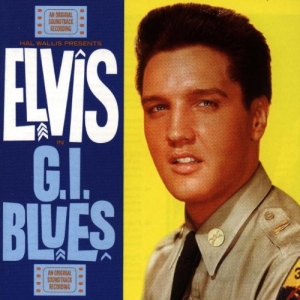 Mettler: Were there other particular records that did that for you, like Elvis Presley?
Mettler: Were there other particular records that did that for you, like Elvis Presley?
Rodgers: Yeah, there were other things kind of nudging me in that direction. Actually, I saw Elvis — he was in the army at the time. He was in uniform and he was in a movie [G.I. Blues, 1960], singing “Wooden Heart” (sings): “Treat me right…” He was walking around singing to different people, and I was really amazed. I was a kid and music hadn’t really struck me yet – it really hits you when you’re a teenager, I think – so I heard this thing and went, “Wow! Who is that guy?” Of course, it was Elvis Presley. It just does something to you, and stays with you.
A lot of different records have hit me at different times. “In the Midnight Hour,” by Wilson Pickett — when that comes on, it just chills me. Even now, these records, when I hear them — it’s like the first time, every time I hear them. There are a lot of records that do that to me. And so people have handed the baton down through the generations, and taken it a little further.
Mettler: I can see you having done that too, considering you are “The Voice,” as people call you. (Rodgers chuckles) Your voice today sounds as strong as it did in 1968. And now you’re heading back out on the road. How do you keep it in shape?
Rodgers: Well, thank you, man; thank you for saying that. It’s important to me to be able to hit the notes and just be able to fly when I sing. I really feel that I’m learning all the time, but I’ll hang it up whenever I don’t think I’m moving forward vocally. There are so many challenges and different parts to the job of singing. I mentioned being in the studio earlier — that’s one aspect. That’s really, really, really precise. You’re in a really clean environment, and you’ve got to keep everything clean and nice because that’s going to be forever.
Mettler: When I spoke with Jack Bruce, he said when it came to singing, it was all about knowing when to use the muscles, and when not to.
Rodgers: Jack Bruce was awesome. I remember seeing Cream way back in my hometown of Middlesbrough when they first came out [circa 1966], and they were all the rage. They had “Cat’s Squirrel” [sings melody line]. Oh, it was very interesting what they were doing. And they were stretching music, because apparently they played in Glastonbury or another show [possibly the 6th National Jazz & Blues Festival in Windsor, Berkshire, England on July 31, 1966], and they only had a half an hour of music. The promoter said, “OK, guys, you’re on for an hour!” And they looked at each other and went, “Oh God, what do we do? We can’t play all the songs twice.” So what they did was they extended the solos, and that became their thing. They stretched it out, and the audience loved it.
Mettler: Speaking of having a long legacy, you celebrated Bad Company’s 40th anniversary in 2014. Did you ever see that coming? Did you ever think that would happen?
Rodgers: No, you don’t. It’s funny — you know, I look at John Lee Hooker, Muddy Waters, and all those guys, and they had a fantastic longevity. I learned something from them. They didn’t try to sell records. They weren’t saying, “OK, what can I write? What can I do in the studio that will sell records?” They were just doing their thing, and people actually picked up on it. I like that whole concept, if it’s even a “concept” — it was just what they did. I like the idea of that. It has a sense of longevity because it’s really worth something. They’re just doing what they feel. Regardless of fashion, they just did their thing, straight down the road. And John Lee Hooker, at the end of his life, was blues royalty, you know what I mean? He had his ups and downs all his life, but he stuck to his guns and just did his thing. I like that.
Mettler: Well, that’s what we want to see when you get to the age of, say a John Mayall. He’s 82 this year, and he’s still going — so no pressure on you, Paul.
Rodgers: Wow. (laughs) I know, hah hah! I love John Mayall too. When I first came down to London, I was struggling to find a band and get things going, and I listened to John Mayall. He pretty much discovered Eric Clapton. Eric Clapton was really fantastic in those days. That album, with Beano on the front —
Mettler: Yeah, the Blues Breakers record (1966).
Rodgers: Oh yeah! Just magical, magical stuff.
Mettler: Yeah, and nobody was allowed to use distortion in the studio in those days; it was against the rules with all the engineers. And John was saying to them, “Look, this is the way we play it live, and this is what we’ve got to do.”
Rodgers: Again, another step forward, and everybody learned from that — what can we do, and what we can feel in the studio?
Mettler: Do what you want to do, and feel “Free” in there, to borrow a name.
Rodgers: That’s right, that’s right. (chuckles)
Mettler: Now let’s dive into some more Bad Company history here. There was a movie of that name already around a year or two before the album came out in 1974. Did you have the name of the band in mind when you wrote the song “Bad Company”?
Rodgers: A couple of things came together, and the light goes on, you know. I remember Mick [Ralphs, Bad Company’s co-founding lead guitarist] and I were looking at what we were going to call our band. We’d written these songs and wanted to put a rhythm section around it and form a band, and we still hadn’t got a name. We hadn’t got a bass player at that point, actually, so everything was still very much in flux.
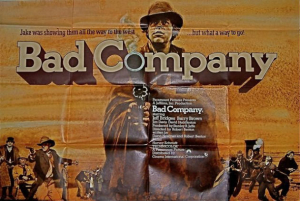 I saw an advertisement, an amazing ad for a movie called Bad Company with Jeff Bridges [a 1972 “acid cowboy” movie, with Barry Brown as the other lead]. I hadn’t seen the movie, I just saw the advertisement in the newspaper. He’s a desperado, and he’s riding alone, and there was a gun — elongated into the “o,” and shooting through Bad Company. So just imagine that. And I thought, “Wow! What a great name for a song!”
I saw an advertisement, an amazing ad for a movie called Bad Company with Jeff Bridges [a 1972 “acid cowboy” movie, with Barry Brown as the other lead]. I hadn’t seen the movie, I just saw the advertisement in the newspaper. He’s a desperado, and he’s riding alone, and there was a gun — elongated into the “o,” and shooting through Bad Company. So just imagine that. And I thought, “Wow! What a great name for a song!”
It also triggered with something I had seen as a child. We had these Victorian books on morals — good, bad, and evil, and things like that. There was this one picture I saw at a friend’s house; I must have been 6 years old. The book fell open, and if you could imagine a Victorian punk back in that day, he was dressed like a gentleman, leaning against a lamppost — but he was definitely not a gentleman. Everything about him was totally ragged. The top was popped out of the top hat, the shoes were busted and broken, but he had everything on — the watch and the chain, the Yukon vest; we call them waistcoats. He was emulating a dude, a smart gentleman. But he was completely ragged and smoking a pipe.
And there’s this little angelic kid is looking up at him — sort of worshiping him, going, “Wow, look at you, man! You’re so cool.” And underneath it, it said (says in foreboding tone): “Beware of bad company.” I’d love to find that picture now. It would make a great album cover. (laughs) I’ve been looking, believe it!
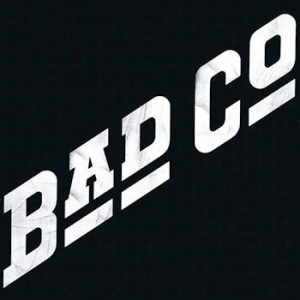 So the two things kind of clicked together, and I sort of visualized it and saw the words. I visualized vast plains, and prairies, and pioneers, being in the crosshairs, and the whole Indian issue, the whole problem of territory and the terrible wars that were fought — all that wildness, the lawlessness of it. I sat at the piano and it kind of (sings the first three chords): dun dun dah… it just kind of wrote itself, in many respects.
So the two things kind of clicked together, and I sort of visualized it and saw the words. I visualized vast plains, and prairies, and pioneers, being in the crosshairs, and the whole Indian issue, the whole problem of territory and the terrible wars that were fought — all that wildness, the lawlessness of it. I sat at the piano and it kind of (sings the first three chords): dun dun dah… it just kind of wrote itself, in many respects.
Mettler: It’s your own three-and-a-half minute movie. And weren’t you standing outside at Headley Grange while you were singing it [in November 1973]?
Rodgers: Oh yeah, when we came to do the track. Often in those days — I don’t do it so much now — we used to do a pilot vocal. I would sing with the guys so they’d know where they were — “this is the verse, and now here’s the chorus, blah blah blah” — and then I’d put the proper vocal on afterwards.
When I came to do this vocal, I thought it would be nice to get some atmosphere. We were in an old mansion, and we had a mobile unit outside — Ronnie Lane’s Mobile Studio actually, and we stretched the mike leads waaaay across and into the fields out there. (laughs) I waited until midnight and the full moon. And then I sang it. “Are the mikes working? Can you hear that (makes crackle noise) OK!?” (laughs) It was very atmospheric. We did a lot of things on that first album.
Mettler: At the end of the song, didn’t you improvise the line, “and the cold wind blows”?
Rodgers: Yes! I hope it picked up on the mike, as you could just hear it blowing across there (does wind whistle) — and you’re so in the moment. You’re there: “and the cold wind blows.” To me, that’s what music is — creating a mood. Taking the listener to the place that you’re going.
Rodgers: We recorded “Do Right by Your Woman” [from 1976’s Run With the Pack] like that as well — outside near a fire, with the acoustics. I don’t think we used that one because the crackling of the fire was so sharp that it picked up really loudly. It’s kind of distracting, you know. (chuckles)
Mettler: You got to deal with one of the most infamous and important managers of all time, Mr. Peter Grant. Do you have a particular favorite Peter Grant memory to share?
Rodgers: Well, I’m often asked that. For me, it’s not about the stories; it’s more about the personality. He was such a great man. He was a big man, but to us, he was a gentle giant. He was always behind the artist. His #1 thing was, “I’ll take care of the business; you take care of the music.” He was great at that. I loved him.
Mettler: People tend to forget that about him, what he did for people like you guys and Led Zeppelin. You got to do your thing and not be distracted.
Rodgers: Well, there is so much business, man. You can get buried in this contract stuff, literally, even now. You decide to do something, and the offshoots contractually are a mess. You’ve got to have eyes in the back of your head all the time. (chuckles)
The thing about Peter was, he was in it for the long run. He wasn’t in it for the quick buck or the money like that. He was your friend. And he was solid, and behind you, all the way. That’s what I loved about him.
And another thing — there isn’t one way of managing. It’s individual, and they all have their own way of doing it. Just like with each guitarist, each singer, each drummer — they all have their own way. They have the same tools to work with, but they do it their own way, and he brought his own unique style to the business of being a manager. And he was well-loved.
Mettler: There really isn’t anybody like him out there nowadays.
Rodgers: I can’t think of anybody. I wish there was. (chuckles)
Mettler: And he always asked how you were doing. He cared about who you were as a person.
Rodgers: Yes. Well, we live in such a high-speed world now. There’s not enough time for the personal, one-on-one touch. We’re just speeding along so much. I know I am. It’s incredible. We get faster and faster all the time with information exchange, one thing or another. I just like to sit quietly sometimes, and go, “Whewwwww.”
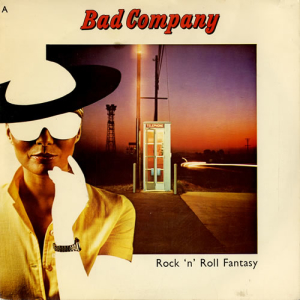 Mettler: Another single we have to talk about is one of the first 45s I ever personally bought, and still have —“Rock ’N’ Roll Fantasy” [Bad Co.’s Top 10 single from 1979’s Desolation Angels], where you picked up that Roland guitar and did something pretty amazing with it.
Mettler: Another single we have to talk about is one of the first 45s I ever personally bought, and still have —“Rock ’N’ Roll Fantasy” [Bad Co.’s Top 10 single from 1979’s Desolation Angels], where you picked up that Roland guitar and did something pretty amazing with it.
Rodgers: It did amaze me when I purchased that. The trouble with the Roland, I have to say, is you couldn’t take it on the road with you because it was so sensitive, that computerized guitar. It didn’t like being knocked about and thrown around in a van. It got a bit erratic to take on the road, but it was great in the studio, as long as you didn’t touch it too much.
But that aside, I was playing around with it and got this amazing sound, and I went, “Wow, this thing is a rock ’n’ roll fantasy.” Boing! It came from that.
Mettler: Me, I also played the B-side, “Crazy Circles,” into the ground. It’s still one of my favorite songs.
Rodgers: Oh really? We talked about Bob Dylan earlier — that song was sort of my Dylanesque touch, really. I had the idea of writing about the meaning of life, I suppose; that’s what it’s all about. It was just a flow kind of thing — I went from the G (sings the riff/chords), and I just let it roll. Sometimes it feels like that, you know? It’s a concentric circle. It’s just a merry-go-round. And not that I want to be depressing in songs, but sometimes I found expressing how you feel is the release for it. You can let it go once you’ve said your piece.
Mettler: Right? Although, in this case, I’m the guy who’s saying, “Hey, let’s get ‘Crazy Circles’ into the set!”
Rodgers: Yeah! Actually, I’m considering that for the next tour. A lot of people have said that. As soon as I pick up an acoustic guitar, though, everybody goes, “Seagull!” (laughs) [“Seagull” is the last song on Side 2 of Bad Company, and has since become a pivotal live staple for Paul, both with Bad Co. and as a solo artist.]
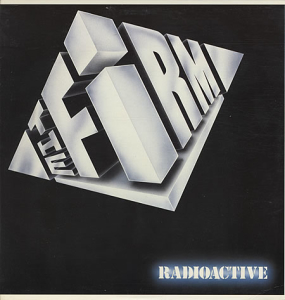 Mettler: And then you played with your longtime friend Jimmy Page for a little while in The Firm. Can you tell me about “Radioactive” [from 1985’s The Firm], since you still sometimes play that one on your own in your solo sets?
Mettler: And then you played with your longtime friend Jimmy Page for a little while in The Firm. Can you tell me about “Radioactive” [from 1985’s The Firm], since you still sometimes play that one on your own in your solo sets?
Rodgers: I do sometimes, yeah. It’s strange. I was putting together a studio in my house in Kingston, just outside of London, and we got everything together — the 24-track, everything — and my producer said, “So what do you want to record?” And I went, “Oh, great, I don’t have something to record!” I sat with a guitar and wrote that song. I played it for Jimmy when we got together and he said, “Well, I like that. Let’s do that.” So we put that one down.
Mettler: That came from being in the moment; I love that. Well, to wrap it up, when you have a good, deep catalog of material like Bad Company does, I love seeing how it appeals to the younger generation that’s getting into rock for the first time. That’s a connection you must be proud to see.
Rodgers: Absolutely! The more people we can reach, the happier I’ll be. It is something of a Rock ’N’ Roll Fantasy, after Mick [Ralphs] and I got together in my cottage in the country in England and we started writing songs and then put the band together around that. Like I said, we were looking for a name, and we came up with Bad Company, and then we hooked up with Led Zeppelin’s manager [the aforementioned Peter Grant]. It was kind of like, “Wow!” It all just opened up for us. All of a sudden we found ourselves touring America with a Gold album. It was a wild and crazy ride, and a lot of fun. And it’s fantastic that people are still digging it.
Mettler: I agree. In fact, I think we can say you’re the longest-running artist to have ever been on the Swan Song label.
Rodgers: Yeah, I guess so — and it’s not quite our Swan Song yet!
Tags: 180-gram, 200 gram, All Right Now, Aound and Around, Bad Company, Blues Breakers, Boz Burrell, Burning Sky, CD, Crazy Circles, Do Right by Your Woman, Elvis Presley, Eric Clapton, Feel Like Makin Love, Free, GI Blues, Going Down Slow, Good Golly Miss Molly, Headley Grange, Heartbeat, Hey Joe, Howlin Wolf, In the Midnight Hour, Jack Bruce, Jimi Hendrix, Jimmy Page, Joe Walsh, John Lee Hooker, John Mayall, Leaving You, Led Zeppelin, Little Richard, LP, Mick Ralphs, Neal Schon, Paul Rodgers, Peter Grant, Radioactive, Ready Steady Go, Rich Robinson, Rock N Roll Fantasy, Roland, Run With the Pack, Shooting Star, Simon Kirke, Straight Shooter, Swan Song, The Firm, The Hendrix Set, The Royal Sessions, vinyl, Wilson Pickett, Wooden Heart